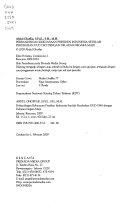Buku pengembangan kurikulum sekolah golf disusun berdasarkan hasil dari kajian yang menyatakan bahwa sudah lama golf merupakan olahraga sekaligus hiburan yang mempunyai banyak guna dari segi bisnis, relasi, bahkan edukasi. Selain itu golf juga dapat menjadi pendorong industri pariwisata. Timbulnya golf sebagai sarana promosi memberikan dampak yaitu mulai banyaknya peminat dari dalam kota, luar kota bahkan luar negeri. Sebagian besar peminat terdiri atas kaum menengah ke atas yang diantaranya adalah bapak-bapak dengan umur sekitar 40-50 ke atas. Tetapi berhubung dengan informasi, prospek, teknologi yang berkembang, pengguna golf berkembang menjadi 40% diantaranya adalah kaum muda dengan umur 18-30 tahun dan sisanya adalah anak-anak. Buku pengembangan kurikulum sekolah golf ini disusun dengan tujuan sebagai salah satu upaya menambah bahan bacaan maupun informasi pengetahuan bagi akademisi maupun praktisi dalam cabang olahraga golf. Selain itu, buku pengembangan kurikulum sekolah golf ini diharapkan juga dapat dimanfaatkan oleh atlet, calon pelatih, serta pelatih golf sebagai bahan referensi untuk mengadakan sekolah atau pelatihan golf maupun dapat dijadikan acuan dalam melaksanakan pembelajaran golf pada atlet.
Buku pengembangan kurikulum sekolah golf disusun berdasarkan hasil dari kajian yang menyatakan bahwa sudah lama golf merupakan olahraga sekaligus hiburan yang mempunyai banyak guna dari segi bisnis, relasi, bahkan edukasi.









